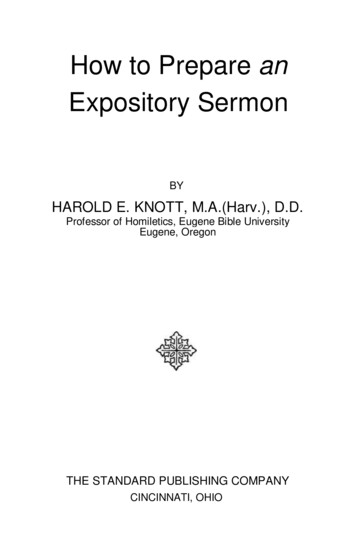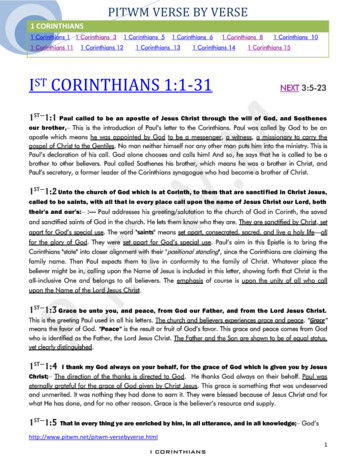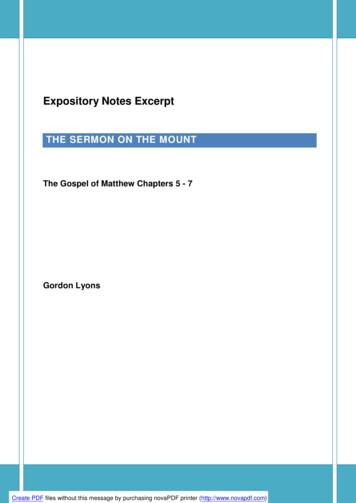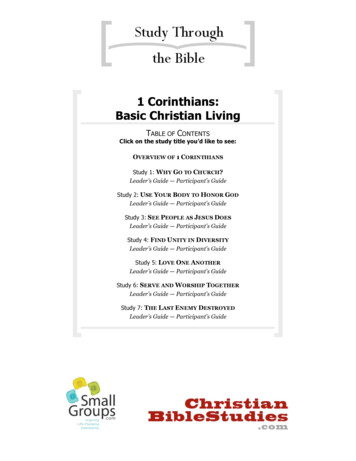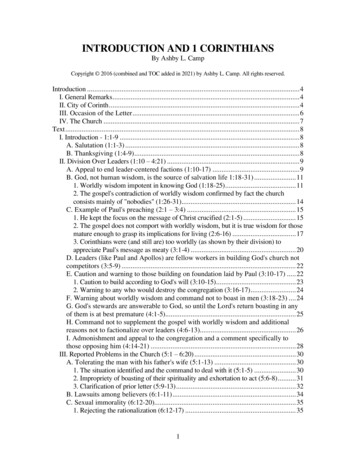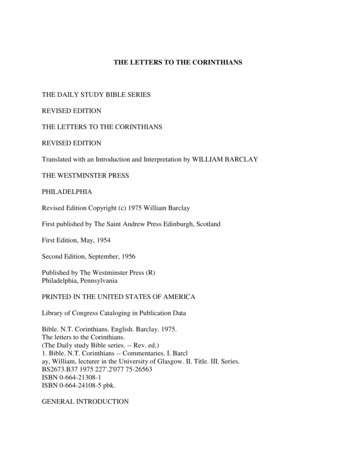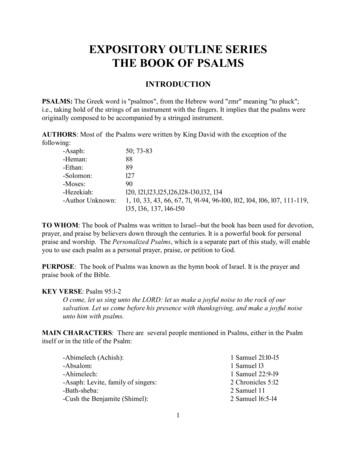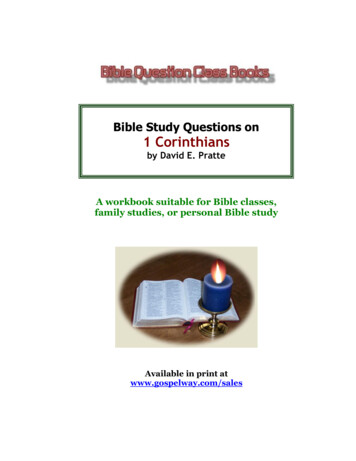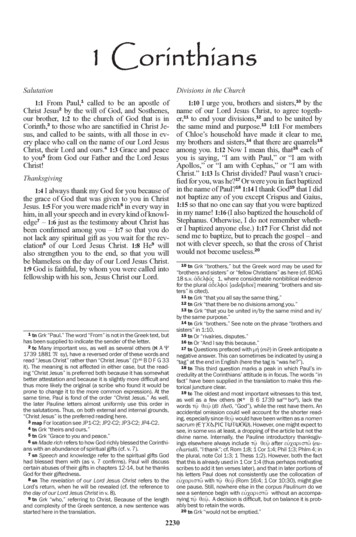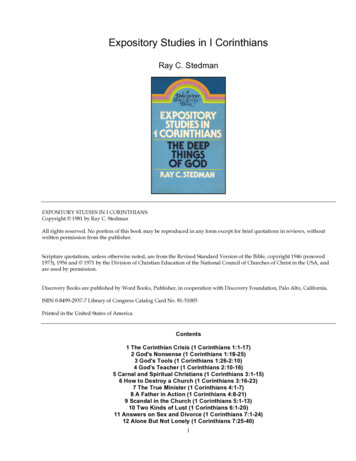
Transcription
Expository Studies in I CorinthiansRay C. StedmanEXPOSITORY STUDIES IN I CORINTHIANSCopyright 1981 by Ray C. StedmanAll rights reserved. No portion of this book may be reproduced in any form except for brief quotations in reviews, withoutwritten permission from the publisher.Scripture quotations, unless otherwise noted, are from the Revised Standard Version of the Bible, copyright 1946 (renewed1973), 1956 and 1971 by the Division of Christian Education of the National Council of Churches of Christ in the USA, andare used by permission.Discovery Books are published by Word Books, Publisher, in cooperation with Discovery Foundation, Palo Alto, California.ISBN 0-8499-2937-7 Library of Congress Catalog Card No. 81-51005Printed in the United States of AmericaContents1 The Corinthian Crisis (1 Corinthians 1:1-17)2 God's Nonsense (1 Corinthians 1:18-25)3 God's Tools (1 Corinthians 1:26-2:10)4 God's Teacher (1 Corinthians 2:10-16)5 Carnal and Spiritual Christians (1 Corinthians 3:1-15)6 How to Destroy a Church (1 Corinthians 3:16-23)7 The True Minister (1 Corinthians 4:1-7)8 A Father in Action (1 Corinthians 4:8-21)9 Scandal in the Church (1 Corinthians 5:1-13)10 Two Kinds of Lust (1 Corinthians 6:1-20)11 Answers on Sex and Divorce (1 Corinthians 7:1-24)12 Alone But Not Lonely (1 Corinthians 7:25-40)1
13 Liberty and Limits (1 Corinthians 8:1-9:23)14 Disqualified! (1 Corinthians 9:24-10:13)15 The Focused Life (1 Corinthians 10:13-11:1)16 Essential Traditions (1 Corinthians 11:2-33)17 The Spirit's Point (1 Corinthians 12:1-6)18 Gifts for the Body (1 Corinthians 12:7-31)19 The Way of Love (1 Corinthians 13)20 Speaking of Tongues (1 Corinthians 14)21 The Foundation of Faith (1 Corinthians 15:1-11)22 What If ? (1 Corinthians 15:12-34)23 The Victory of the Mystery (1 Corinthians 15:35-58)24 Giving and Living (1 Corinthians 16)Appendix: First Corinthians in a Condensed OutlineEXPOSITORY STUDIES IN I CORINTHIANS1 Corinthians 1:1-171. The Corinthian CrisisSome years ago on a Sunday morning I was preaching on a section from the sixth chapter of 1 Corinthians. I wascommenting on verse 9 where the apostle says,Do you not know that the unrighteous will not inherit the kingdom of God? Do not be deceived; neitherthe immoral, nor the idolaters, nor adulterers, nor homosexuals, nor thieves, nor the greedy, nordrunkards, nor revilers, nor robbers will inherit the kingdom of God. And such were some of you.I remember I was so struck by those words, "such were some of you," that I stopped and said to the congregation,"This was the makeup of the church at Corinth. These people had come out of this sordid background. Many ofthem, perhaps, still were struggling with much of the aftermath in their lives of these evil things. I am curious asto how many of you here have some of these things in your background." I then did a rather bold thing. I said, "Ifany of you have anything like this in your background I'd like to ask you to stand where you are quietly for amoment that we might know how much we're like the church at Corinth."I did not know it, but a young man was present with us that morning who had never been in church before. Hetold me afterward that he had been converted at a recent Billy Graham Crusade, and he came to church with fearand trembling, not knowing what he was getting into. He said he heard me make that announcement, and helooked around to see if anyone would stand. At first no one did, but then a little old lady right on the aisle got up.Others then began to stand, and soon two-thirds of the congregation was standing. This young man said helooked around at that crowd and said to himself, "These are my kind of people!"That story highlights a feeling I often have when reading these Corinthian letters. There is no church in the NewTestament more like the churches of San Francisco, or New York, or Chicago than this Corinthian church. Corinthwas a city of wealth and culture, at the crossroads of the Roman Empire, through which all the trade andcommerce of the Empire passed. It was a city of beauty, a resort city, but it was also a city of prostitution andpassion. It was devoted to trade and commerce, but also the worship of the goddess of sex.On the little hill that rises behind the ancient city there was a temple to Aphrodite, and every evening the priestsand priestesses--male and female prostitutes--would come down from the temple into the streets to ply theirtrade. Corinth was known throughout the length and breadth of the ancient world as a city of great andwidespread immorality. It was in some ways, therefore, what we could call the San Francisco of the ancientworld. The letter might well be titled, "First Californians." Here are the opening words:2
Paul, called by the will of God to be an apostle of Christ Jesus, and our brother Sosthenes (If you have read the Book of Acts lately you will know that Sosthenes was at one time the ruler of the synagoguein Corinth. He had been converted, evidently, after a difficult time in that city and now is with Paul in Ephesus.)To the church of God which is at Corinth, to those sanctified in Christ Jesus, called to be saints togetherwith all those who in every place call on the name of our Lord Jesus Christ, both their Lord and ours:Grace to you and peace from God our Father and the Lord Jesus Christ.Paul is writing this letter from Ephesus in about AD. 56 or 57. He had founded the church in Corinth about fiveyears earlier when he had come alone, driven out of Macedonia by the persecution there. He had left Timothyand Luke behind and had come to Athens, and from there to Corinth. After the founding of the church (whichtook about two years) he left and went on other journeys. Now he is in Ephesus, and word has come to him thatthere is difficulty in the church at Corinth.Troubles and QuestionsPaul wrote a letter to the Corinthians (referred to in the ninth verse of the fifth chapter) which has been lost to us.All we know of it is what the apostle says there, that he wrote the letter to the Corinthians telling them that theyshould not keep company with those who had fallen into immorality. Subsequently, a group of men had comefrom Corinth to visit him in Ephesus (their names are given in the final chapter of this letter: Fortunatus,Stephanas, and Achaicus), and they had brought word, evidently, of further troubles there. With them they alsobrought a letter from this church asking the apostle to answer certain questions that they had. First Corinthians ishis answer to that letter and the reports that he had received from the Corinthian church.In some ways, most remarkably, this letter is different from the other letters the apostle wrote. His letters usuallybegan with a rather lengthy doctrinal section and closed with a practical section in which he applied what he isteaching. But here, right from the very beginning, he plunges into the problems of the church, and intersperses apracticality of doctrine with revelations of truth throughout the letter.This is certainly the most practical of all Paul's letters. Even in this opening greeting, his concern for the church inits various problems is clearly reflected. It begins with an emphasis upon his apostleship. "Paul, called by the willof God to be an apostle." That affirmation was necessary because certain ones in Corinth were ready to challengethat fact on the grounds that Paul had not been one of the original twelve disciples. Some were wondering if hewere not even a false apostle; therefore, he puts his apostleship first as he writes.Then in verse 2 he describes the Corinthians as "sanctified in Christ Jesus." Now, in almost all the other letters,Paul's greeting to people is based not upon sanctification, but justification. But here he refers to this group ashaving been sanctified. These two words are theological terms. Justification is the description of the change Godmakes within an individual when he comes to Christ. It is what we also call being "born again," an experience thatwe are hearing much of today. It means an inward change of nature, and therefore a fundamental difference inoutlook and attitude because of a deep change within. Now sanctification is the visible result of that in thebehavior of individuals. It is all that inner change working out in terms of practice so that you see that someone isdifferent. Paul refers to this with the Corinthians because their behavior was what was in question.At the close of that same verse he stresses the Lordship of Jesus. He sends the letter to all those "who in everyplace call on the name of our Lord Jesus Christ," and that would surely include us. Then he adds, "both their Lordand ours." This was because in this Corinthian church there were people who were turning away from theauthority of Jesus, and following after men. Divisions had come into the church, and early in the letter the apostlereflects his concern over their departure from the centrality of Christ.Bad News and Good NewsIn verses 4 through 8 the apostle starts with the good news for these people. He has both bad news and goodnews for them in this letter, but as he always does, he starts with the good news: that which is true of them3
because they are Christians, regardless of how they are behaving. He lists some of the fullness of provision thatthey enjoyed because they were Christians.I give thanks to God always for you because of the grace of God which was given you in Christ Jesus,that in every way you were enriched in him with all speech and all knowledge--even as the testimony toChrist was confirmed among you--so that you are not lacking in any spiritual gift, as you wait for therevealing of our Lord Jesus Christ; who will sustain you to the end, guiltless in the day of our Lord JesusChrist.Paul takes note of several things that were true of the Corinthians, and they form the foundation of his approachto them, Freely he admits there were blessings and possibilities and provisions God had given them that theyfully and freely shared. First of all, notice that their entrance into the Christian faith was orthodox, i.e., they weresaved by grace: "I give thanks to God always for you because of the grace of God which was given you in ChristJesus." These people had been pagans, and now they are born again by having received the grace of God.In this letter there is no problem or wrestling with the matter of legalism. These people were not caught up withwrong rituals (you have that in the letter to the Colossians); they were not involved with disputes overcircumcision (you get that in Galatians); and there was no resting upon dead works (you get that in Philippians).Here in Corinthians the problem was license. They had accepted the grace of God in such a way that they did notthink it made any difference how they behaved, and that is what was causing the problem.Now, the apostle admits that they understood the grace of God. There are no questions raised in this letter on thedeity of Christ or the virgin birth, or the substitutionary atonement, or the incarnation of Jesus. They allunderstood that they were set free from their sins by the gift of God through Jesus Christ. Their entrance,therefore, is clearly based upon God's grace.Furthermore, Paul says, their equipment, having become Christians, is superb: "in every way you were enrichedby him with all speech and all knowledge" (v. 5); "so that you are not lacking in any spiritual gift as you wait forthe revealing of our Lord Jesus Christ" (v. 7). "In every way," he says, "you were enriched."The word for "enriched" is the word from which we get our word plutocrat. They were rendered plutocrats,spiritually. They had a wealth of enrichment, and Paul points out that it was in two particular areas, in the wordand in knowledge. The word for "speech" here is really the word logos, the word of God. This is his admission tothem that they were avid Bible students. They did not have the New Testament as we have it--it was not writtenyet--but they had among them New Testament prophets who were preaching and teaching the same truth thatwe have in the New Testament. Therefore, they had all the truth available to them that is available to us.The Corinthians were theologians, very likely, and, as was often true in Greek cities, they loved to get together todiscuss philosophies and doctrine and to probe various problems. They were, therefore, able to answer some ofthe deep and heavy questions with which we still wrestle today. I am sure they could have told you where Caingot his wife. They could have told you what happens to those in other lands who never hear the gospel. Theycould have told you when the Antichrist would appear. They were Bible students, and Paul recognizes that andcommends them for it. They were theologians; they were Trinitarian, supralapsarian trichotomists! (You may notknow what that means, but they did!)Now, more than that, Paul says, they were not lacking in any spiritual gift. In my book, Body Life, I have listed atleast 21 different spiritual gifts that are referred to, and, according to Paul, there in Corinth every one of them wasmanifested. They had gifts of miracles, healings, teachings, tongues and interpretation of tongues, knowledge,and leadership. There was not a single one of the gifts of the Spirit lacking in this church. Can you imagine whatkind of fascinating meetings they must have had when they all got together? No one wanted to miss church inCorinth! They never knew whether somebody would be healed, or some miracle would be demonstrated, orsome remarkable prophetic utterance would come forth, or somebody would speak in a language they had neverlearned and someone else would interpret.But that is still not all. Not only was their entrance orthodox and their equipment superb, but their expectationwas right. They were waiting for the revealing of our Lord Jesus Christ; they understood that when he appeared4
he would set things right on earth. They were not given to naïve and liberal delusions that they would, by theirown efforts, handle all the problems of the world and correct all the evil in life and so bring in the kingdom. Theywere not propounding self-reliant schemes for earning status and a position of blessing with God. Theyunderstood that it was Christ who would sustain them to the end. It was he who would present them blamelessbefore the Father. Paul acknowledges that all this is true of them.Failure in the ChurchBut then in verse 9 the apostle seems suddenly to change the subject, and he introduces rather abruptly adescription of the fellowship that they needed among them,God is faithful, by whom you were called into the fellowship of his Son, Jesus Christ our Lord.This is the key verse of 1 Corinthians. God had called them to a very important relationship. By implication, hereat the very beginning of this letter we learn the reason for all of the problems in the Corinthian church. They hadnot understood the implications of their calling, and the relationship they personally and individually had withJesus Christ himself. Instead (as we see beginning with the very next verse), the apostle has to deal with divisions,scandals, lawsuits, immorality, drunkenness, quarreling, and with much misunderstanding of the truth aboutidols and demons and various other matters. It is clear that despite this full provision which they had received,they were experiencing a great failure in the church. They had the ability to do all these mighty things in theSpirit, but not much was happening out in the city. Instead of making an impact on Corinth, Corinth was makingan impact on the church. All these ugly attitudes and actions going on every day and night out in the city werebeginning to infiltrate the church. Despite all their mighty provision, there was little manifestation of the power ofGod. It reminds me of Peter Marshall's vivid description of contemporary Christians; "Christians are like deep-seadivers, encased in suits designed for many fathoms deep, marching bravely forth to pull plugs out of bathtubs!"What was wrong? Well, what was wrong was the Corinthians' lack of understanding of what it meant to haveJesus Christ living within them. I have traveled widely in the course of my work, and almost everywhere I havegone I have found that the major struggle of churches is right at this point. They have lost the sense that Jesus isamong them, that they have an individual relationship to the Lord of glory himself. They no longer live their livesin the awareness and the excitement that they are partners with Christ in everything they do. When that begins tofade from Christian consciousness all these troubles that the Corinthians were experiencing begin to crowd inupon us. Therefore, this letter is written to call these people back, as it is written to call us back as well, to anawareness of what it means to have fellowship with Christ.Fellowship with Christ is the work of the Holy Spirit. It is his task to take the things of Christ and make themknown to us, to make the person of Jesus vivid and real in our daily experience. That is what Paul is talking abouthere--Christ made real to the heart, enabling him to satisfy the thirsts of the soul; Christ providing the power ittakes to meet the demands of both the law and the love of God. Fellowship with Christ is not only direction inwhat to do, it is also dynamic--it is how to do it. Oftentimes churches fall into the habit of trying to draw directionfrom the Lord with no awareness of the great provision of the dynamic. It is not only guidance he gives us, butresource as well. It is not only an understanding of life, but an undergirding, in order that we might perform it. Itis not only a program that he sets before the church, but the power to carry it out.When any one of us forgets this, we drift into the terrible syndrome of recognizing the Lord on Sunday, and fromMonday through Saturday living our life on our own without any recognition of his presence with us. He is nolonger Lord of all our life, but only a part of it. If he is not Lord through our life all day long then he is Lord onlyof the margins, only of the left-overs, only of the weekends. The church is called to an understanding of thepresence of Christ in the human heart to supply to it the dynamic, the sense of adventure, the innovative spiritthat opens doors in unusual and unanticipated ways, tending adventure and color to life.Now this was what was missing in Corinth, and as we open this letter and go on into it further, we will see howin every case the apostle calls them back to that. They were suffering divisions because they had lost sight of theLordship of Jesus. They were immoral because they had forgotten that the members of their bodies were themembers of Christ. They were in lawsuits with one another because they had failed to see that Jesus was judge ofthe innermost motives of the heart. They were quarreling because they had forgotten that others were members of5
Christ's body and, therefore, they were members one of another. All that the apostle does to heal the hurts atCorinth is to call them back to an awareness of fellowship with the Lord Jesus Christ.Appeal for UnityNow the apostle Paul begins dealing with incipient division in the church at Corinth, in a powerful appeal forunity, verse 10:I appeal to you, brethren, by the name of our Lord Jesus Christ, that all of you agree and there be nodissensions among you, but that you be united in the same mind and the same judgment.Paul always expresses great concern about the possibility of a split in the church. You may be reminded by hiswords in verse 10 of the similar passage in his letter to the Philippians where, in chapter 2, he says to that church(vv. 1, 2),So if there be any encouragement in Christ, any incentive of love, any participation in the Spirit, anyaffection and sympathy, complete my joy by being of the same mind, having the same love, being in fullaccord, and of one mind.You may recall also that in writing to the church at Ephesus he exhorted the elders there to be careful to "maintainthe unity of the Spirit in the bond of peace" (Ephesians 4:3).Church unity is a very important matter, and because of its significance Paul puts it first in the list of problems hehas to deal with here at Corinth. Many of the other problems were flowing out of this division within thecongregation. Here in verse 10 he briefly shows us the ground of unity, and the nature of unity in a church. Theground, of course, is the name of our Lord Jesus Christ. "I appeal to you," he says, "by the name of our Lord JesusChrist." Their relationship to Christ was the only unifying factor of the church. There is no other name bigenough, great enough, glorious enough and powerful enough to gather everybody together, despite the diversityof viewpoints and the differences of background or status in life, than the name of Jesus. That is why the apostleappeals to it. He recognizes that we share a common life if we have come to Christ; we are brothers and sistersbecause we have his life in us. He is the ground, always, of unity. And more than that, we have a responsibility toobey him, to follow his Lordship. Therefore, the only basis upon which you can get Christians to agree is bysetting before them the Person of the Lord Jesus, and calling them back to that fundamental base. This is whatPaul does here.He describes the nature of unity in this way, "that you be united in the same mind and the same judgment." Thatdoes not mean that everybody has to think alike. With all the differences among people it is impossible to getthem to think alike. But yet the apostle says they are to be "of the same mind." Now how could that be? I think theletter to the Philippians helps us here, because in the passage just quoted Paul goes on to say, "Let this mind be inyou which was also in Christ Jesus." He then describes for us the mind of Christ as a willingness to give up rightsand personal privileges and take a lower place. Then comes that great Christological passage where he describesJesus, who, though he was in the form of God, did not count equality with God a thing to be grasped, butemptied himself, taking the form of a servant, being born in the likeness of men. And being found inhuman form he humbled himself and became obedient unto death, even death on a cross (Philippians2:6-8).That is the mind Paul is talking about. When everybody decides to put the things of Christ first, and is willing tosuffer personal loss that the honor and glory of Christ might be advanced, this is what brings harmony to acongregation. That is always the unifying factor in a church, and that is the mind that is to be among us, the mindthat does not consider itself the most important thing.I remember a few years ago being at a Family Congress in St. Louis, Missouri. One of the evening speakers wasDr. Oswald Hoffman, the very capable and powerful preacher on the Lutheran Hour radio program. He wasintroduced in a rather extended and flowery way, but he came on and in his great booming voice said, "I'm not6
Dr. Oswald Hoffman, the great preacher of the Lutheran Hour. I'm a nobody--just like you!" I've not forgottenthat incident because it seems to rue to capture the very attitude Paul is describing here. Who are we, that weshould put our interests and our desires ahead of those of the Lord for his church? The church never belongs toanybody but the Lord. This is what Paul uses as the basis for unity in this church--not only the attitude ofselflessness, which is the mind of Christ, but the responsibility to submit to his Lordship, the commonresponsibility that we have together.Paul goes right on in verse 12 to describe the forms that these divisions were taking in the church of Corinth:What I mean is that each one of you says, "I belong to Paul," "I belong to Apollos," or "I belong toCephas," [another name for Peter] or "I belong to Christ."There was the real trouble at Corinth. These were not full-blown schisms yet; they had not split off into othercongregations, but there were four cliques, or factions, within the congregation. There were, first of all, theloyalists who said, "We are of Paul. He started this church. We came to life in Christ by Paul, and Paul is the onewe're going to listen to above all others." Undoubtedly there was a big group that followed Paul. Then there werethe stylists, those who were attracted by different styles of preaching, and they had especially been drawn toApollos. From the Book of Acts we learn that Apollos was an outstanding orator in a world that loved andappreciated oratory. He was a rhetorician who was especially capable in the allegorical style of teaching of theOld Testament. I am sure there were many in Corinth who were saying, "Oh, I love to hear Apollos! He's a greatpreacher, a warm, capable, eloquent man, who can make Scripture come alive!"Then there were the traditionalists (there always are), those who say, "Well, I don't know about Paul or Apollos.Let's get back to the beginnings. Let's go back to Jerusalem. We are of Peter." (Peter, evidently, had been throughCorinth and had preached there.) So they said, "When Peter came, we really felt that we were on solid ground.After all, he was one of the first apostles that Jesus himself called." So they were quarreling over the relative meritand authority of these various teachers.There was still a fourth group, and in some ways I think they were probably the worst. They were drawingthemselves up and saying, "Well, you may be of Paul or of Peter or of Apollos, but we are of Christ! We go backto the Lord alone. What he says we'll listen to, not Paul or Peter or anyone else--it makes no difference to us."With that spirit of self-righteous smugness they were separating from the rest, dividing up the congregation andquarreling with one another over these things.Now, you do not have to be very old to recognize that this is still a problem in the church. The same viewpointsare still dividing people. There are those who are emotionally attached to some great Christian leader who hashelped them, and they will only listen to him. They read only his books or listen only to his tapes. And there areothers who are drawn to some speaking style that has attracted them. They love to listen to someone because heturns them on emotionally. There are still others today who follow after some school of thought. It is the popularthing today to cry, "Back to the Reformation!" If someone comes along preaching the doctrines emphasizedduring the Reformation he will get a great following among the people who think that the Reformation was thewhole sum and substance of all great Christian truth.Some people will pick other matters of doctrine to affirm. There are the Calvinists and the Arminians and theDispensationalists--these represent some of the things held up as the "summum bonum" (the highest good) intheology. If you survey the church scene all over America today you will find people dividing up this way. Somesay, "I am of Gothard," and others say, "No, I am of Bright." Still others say, "We are of Schaeffer," and others, "Weare of Graham," or, "We are of C. S. Lewis."Clearly Paul is deeply troubled by this. It is a serious threat to the life of a church to find people choosing favoritepreachers to the degree that they do not want to listen to anyone else. Now, we all have our favorite preacher,and up to a point that is not wrong. There are some people who minister to us better than others, and it is onlynatural that we should listen to them and follow them. But it is the exclusiveness that Paul is concerned abouthere--people who do not even want to come to a service if someone other than their favorite is preaching. That iswhat Paul speaks about.7
Christ Parceled OutIn verse 13 Paul gives us three clues as to what is wrong with this kind of thing. To all of this he asks of Corinth,as he would ask of us,Is Christ divided? Was Paul crucified for you? Or were you baptized in the name of Paul?Here are our first clues as to what is wrong with this kind of cliquishness in a church. The first thing, Paul says, isthat it tends to chop up Christ and parcel him out as though his person and his work came in various packages;thus you lose a true perspective of the whole of Christian theology. When you follow one man you are getting aview of Christ, but there is no teacher in the church who has ever come along--including the apostle Paul himself-who has ever set forth a totally complete view of Christ. That is why we have four gospels, because not even oneof the disciples who was with the Lord was capable of giving us a complete enough view of Christ. It took fourviewpoints to report his earthly life and ministry accurately enough to us. God, therefore, has designed that therebe many teachers, many preachers, many viewpoints, in a church. In the Body of Christ at large there are manywho can make a contribution to our understanding of Christ.The second thing Paul says is, "Was Paul crucified for you?" There he indicates that the problem with cliquishnessis that it tends to overemphasize the significance of the human leader. It builds him up too much; it makes him arival, to some degree, of the Lord himself. People begin to think things about their favorite that are not true, andexpect things from him which he is unable to deliver. I have had to do some degree of battle with this myself. Ihave had people say to me, "Oh, Mr. Stedman, when you speak I see things so clearly! I hang on every word yousay. Whatever you say, I believe." (I have been trying for a long time to get my wife to accept that!) That is a verydangerous attitude, and yet we tend to think of individuals as being the channel by which deliverance can cometo our heart.But it cannot come that way. Paul is putting his finger right on the problem when he asks, "Was Paul crucified foryou?" Not a single Christian teacher ever lived
20 Speaking of Tongues (1 Corinthians 14) 21 The Foundation of Faith (1 Corinthians 15:1-11) 22 What If ? (1 Corinthians 15:12-34) 23 The Victory of the Mystery (1 Corinthians 15:35-58) 24 Giving and Living (1 Corinthians 16) Appendix: First Corinthians in a Condensed Outline EXPOSITORY STUDIES IN I CORINTHIANS 1 Corinth
